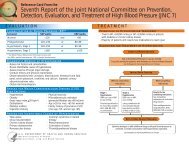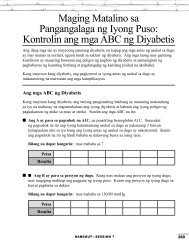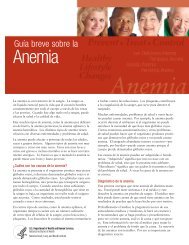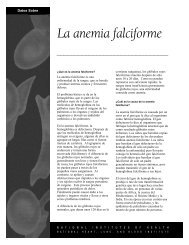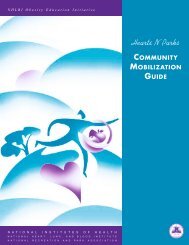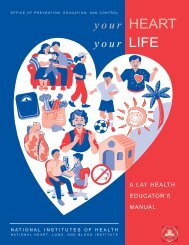WOMEN 'S HEALTH AND MENOPAUSE : - National Heart, Lung ...
WOMEN 'S HEALTH AND MENOPAUSE : - National Heart, Lung ...
WOMEN 'S HEALTH AND MENOPAUSE : - National Heart, Lung ...
Create successful ePaper yourself
Turn your PDF publications into a flip-book with our unique Google optimized e-Paper software.
ange of variables, such as genetic factors, diet,<br />
education, marital status, number of pregnancies,<br />
the kind of work she has carried out, social support,<br />
and access to health care. 52<br />
Access to health<br />
care varies widely<br />
among countries.<br />
Women’s choices<br />
around menopause<br />
are said to bear<br />
consequences for<br />
their health in old<br />
age. For a long time, hot flushes and night sweats<br />
were considered to be core symptoms of menopause<br />
and the most important reason for using HRT.<br />
More recently, HRT has been widely promoted for<br />
prevention against osteoporosis, CVD, and an<br />
array of other conditions. Educated women in<br />
industrialized countries with well-developed medical<br />
care are a privileged group with access to the<br />
most recent information on HRT, whereas other<br />
groups have less access and less knowledge. On<br />
the other hand, medicalization of menopause in<br />
cultures in which menopause is not perceived as a<br />
problem is an important issue that should be debated.<br />
Some critics have questioned the role of the<br />
pharmaceutical industry in influencing health care<br />
through product promotion. 53 Women need education and<br />
balanced information to make<br />
personal decisions regarding<br />
whether to use HRT.<br />
Developing countries<br />
with scarce resources are less likely than developed<br />
countries to allocate funds for care of<br />
menopausal women. In addition, the inequality<br />
among social groups within countries can result in<br />
very different access to information and care.<br />
Promoting positive attitudes to aging and to<br />
menopause could be important in modifying symptoms<br />
and improving the health of women. 54<br />
Women need education and balanced information<br />
to make personal decisions regarding whether to<br />
use HRT. An important goal for health care<br />
providers should be to educate women. Such education<br />
should lead to greater equality among<br />
women in different cultures and social levels and<br />
help women control their own health.<br />
72<br />
6. CONCLUSIONS<br />
Menopause has long been considered a turning<br />
point in women’s lives in western cultures.<br />
Although menopause as a physiologic event<br />
remains constant, attitudes toward and beliefs about<br />
menopause vary considerably historically and<br />
cross-culturally. In the past decade, there has been<br />
a heated debate among biomedical and social scientists<br />
as to whether menopause should be seen as<br />
a deficiency disease rather than a natural event.<br />
Cross-cultural comparisons fuel the debate by<br />
showing that the relation between hormones and<br />
symptoms is, indeed, complex. There are significant<br />
differences in patterns and prevalence of<br />
symptoms between countries and, interestingly, in<br />
the types of symptom reported in different ethnic<br />
groups within countries. It is difficult, however, to<br />
draw firm conclusions from available cultural and<br />
ethnographic comparison studies because of a<br />
number of limitations. Among these are differences<br />
among cultures in language used to describe symptoms<br />
and in women’s inclination to report symptoms;<br />
use of different methodologies in study<br />
design and instruments used to measure symptoms;<br />
and differences in diet and other lifestyle factors<br />
that make it difficult to establish cultural versus<br />
biologic reasons for symptom expression. (See ch. 3.)



